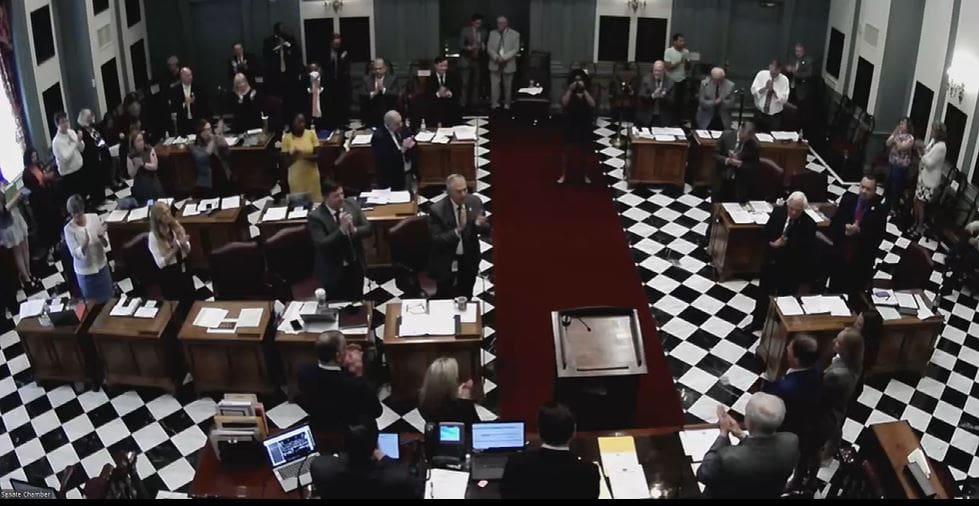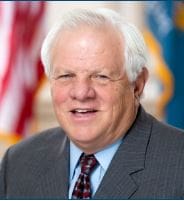
Delaware Senate applauds state comptroller general’s office for making the budget process smoothly.
The Delaware Senate on Tuesday passed 2023 budget bills including the largest state operating budget in Delaware’s history at $5.1 billion, reflecting a rise in spending of 6.9% in spending over the previous year.
It also will increase Delaware’s Rainy Day Fund from $280 million to $316 million and the Budget Stabilization Fund from $287 million to $402 million.
Both funds can be used in the future during economic downturns. For example, the state accessed the stabilization fund in 2020 when the COVID-19 pandemic hit and revenues fell short.
“Hopefully, we never need it,” Paradee said, “but it is there.”
The Senate also passed a $379 million supplemental spending plan consisting of one-time expenditures and a contingency fund.
It pays for things such as a $500 one-time supplement for state employees and pensioners, investment in post-retirement funds, $38 million for increases in the Delaware Firefighters Pension, $21 million to fund the Delaware Family and Medical Leave Insurance Program, $2.6 million for the Redding Consortium for Educational Equity, $50 million to help pay the $300 tax rebate to Delawareans, and $1.5 million for adult education and workforce retraining in Sussex County.
Both budget bills are now headed to the House for a vote. If they pass and Gov. John Carney signs them, they will take effect July 1 as the 2023-24 budgets.
The budget presented in Senate Bill 250 by Sen. Trey Paradee, D-Dover and co-chairman of the budget-writing Joint Finance Committee, came in slightly over Carney’s recommended $4.9 billion budget.
Paradee said he expects the operating budget to be criticized for being the first over $5 billion and because spending will rise by 6.8 percent.
That rise is below the rate of inflation, which is around 8.5%, he said.
A lot of the increase in spending is to the benefit of state employees, state retirees and Delaware citizens, he said.
Republicans react
“We may disagree on the bill itself, but there’s no question this could have been a run. Spending could have run crazy” because of strong revenue increases, said Sen. Colini Bonini, R-Dover. “Thank you for tamping it down.”

Sen. Colin Bonini
Delaware has had two years of $1 billion surpluses, largely because of COVID-19 funds paid to people and businesses and high real estate transfer taxes.
Bonini praised the committee for putting money into the emergency funds and asked whether switching state employees to a Medicare Advantage plan had saved the money the state expected it to.
Robert Scoglietti of the Office of the Controller General said switching to an insured product will reduce the liability for the post-employment benefit fund that provides healthcare for the state’s retirees.
Rep. Gerald Hocker, R-Ocean View, said he would not vote for the bill.
“I rise in opposition to it because as a business person, I try to look out in the future a little bit, and I don’t think the future is going to be as good as it was this year,” he said. “We’re very fortunate to have the largest gains that we’ve ever had, but we got the largest spending budget we’ve ever had, also the largest increase.”
He said the state had lean years and that the gross receipts tax was a result of one of those. When that tax was put in under Gov. Russell Peterson in the early 1970s, Hocker said he was promised it was temporary, but it had never been lifted.
“We had a chance this year to give back to those that are paying in and got us through the years, and we haven’t given back a penny on this budget,” Hocker said. “So, therefore, I will be voting no.”

Gerald Hocker budget bills
Paradee said this budget does not represent the largest increase in spending. The Joint Finance Committee checked to see what had been done in other years of inflation, he said, and there were increases well beyond the 6.8% in the late 70s and early 80s.
Hocker also pointed out that the state voted to increase pay, but that rise had not kept up with inflation, and he thinks the state will end up with another problem because of that.
Sen. Dave Lawson, R-Marydel, also thanked the Joint Finance Committee, which he’s a member of, for their hard work. He said he was particularly grateful that the McNesby Act, designed to provide aid for adults with intellectual and developmental disabilities, has been fully funded.
Ultimately, both Bonini and Hocker voted no on the operating budget, which requires a 2/3 approval.
The other 19 senators voted yes.
The supplemental spending bill passed unanimously.
What’s in budget bills
The budget bills include:
- $19 million to Delaware’s Purchase of Care program that helps low-income families afford early childhood and after-school education for children up to the age of 12.
- $17 million in school bus drivers and related programs after a workforce shortage that predated the pandemic and a brief strike.
- A four-year commitment to fully fund increases in the reimbursement rates for direct support professionals who serve adults with intellectual and developmental disabilities.
- $16.5-million increase to reach 100% of the benchmarks required by the McNesby Act, funding that will result in an additional $27.5 million in federal matching funds.
- $104 million to provide a 3% pension benefit increase for former state workers who retired between June 30, 1992 and June 30, 2017 and a 2% increase for those who retired after June 30, 2017.
- Approximately $55 million to help keep state employee wages competitive through increases ranging from 2.3% to 9% for the lowest pay grades, in addition to negotiated collective bargaining unit and statutory step increases.
- $38 million to increase pension benefits for volunteer firefighters, the first pension increase of its kind since the program was established in 1986.
- $14.2 million to fund targeted education and support services for Wilmington students, as recommended by the Redding Consortium for Educational Equity and the Wilmington Learning Collaborative.
- $8 million to continue increasing mental health supports in Delaware elementary schools.
- $3.6 million to increase rates for private duty nurses and home health care workers.
- $2 million to create a Substitute Teacher Block Grant that will help school districts address teacher shortages through the hiring of full-time substitutes.

Betsy Price is a Wilmington freelance writer who has 40 years of experience, including 15 at The News Journal in Delaware.
Share this Post




